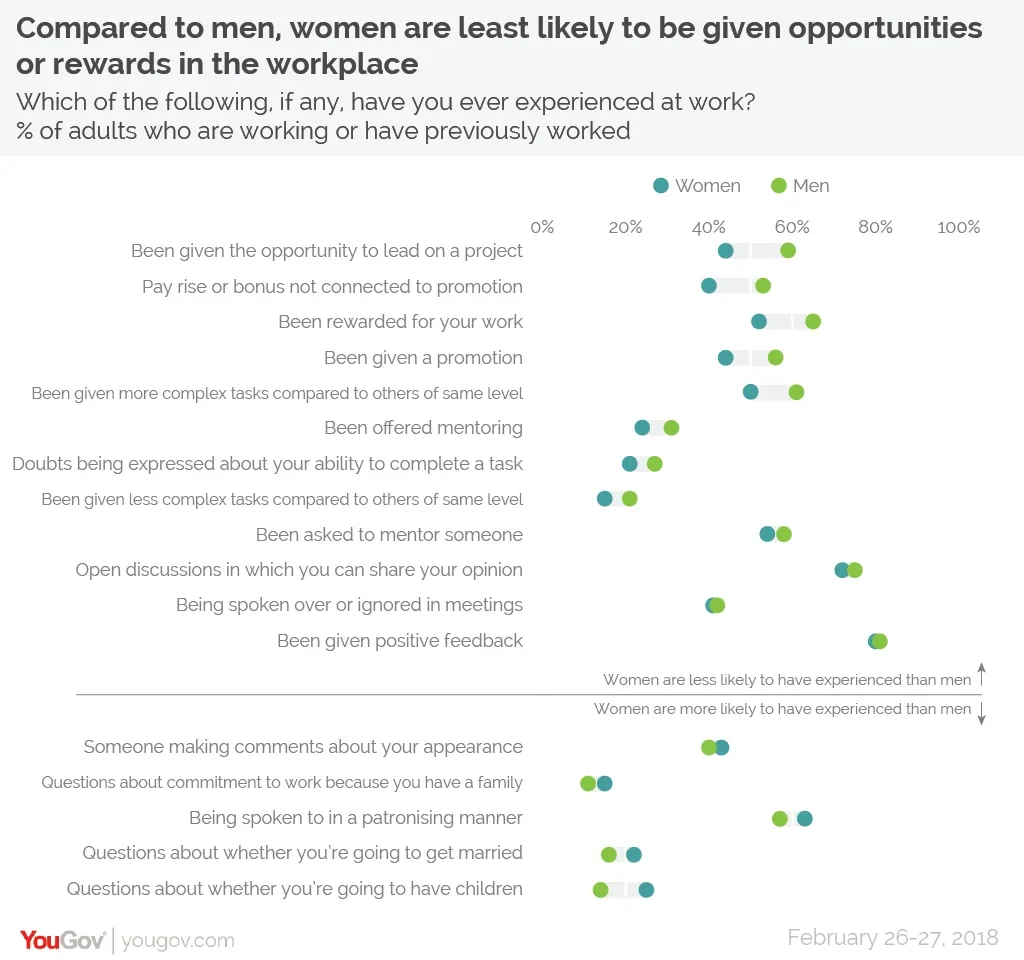New YouGov research looks at which experiences at work men and women are most and least likely to share
Each year International Women’s Day brings together governments, organisations and charities to celebrate women and encourage gender equality. This year’s theme is #PressForProgress, a specific call to motivate whole communities and work places to be gender inclusive. At a time where women’s rights are dominating the news, the push for gender parity seems to have momentum.
New YouGov research now explores the similarities and differences between men and women’s experiences at work and uncovers where the major disparities still exist.
Compared to men, women are least likely to be given opportunities or rewards
The results show that, of the 17 workplace areas we asked about, the one that women are least likely to have experienced compared to men is being given the opportunity to lead on a project. While six in ten men (59%) have been had the chance to take charge of a project, this falls to 44% among women.

Furthermore, while more than half of men (53%) have experienced a pay rise or bonus not connected to a promotion, only 40% of women say the same. Additionally, approaching two thirds (65%) of men feel they have been “rewarded for [their] work”, compared to only half (52%) of women, and men are 12 percentage points more likely to have had a promotion than women (56% vs 44%).
On the other hand, women are also noticeably more likely than men to face questions about their personal lives. A quarter (25%) have been asked whether they are planning to have children, compared to only 14% of men. Similarly, women are more likely to have been questioned about whether they plan to get married (22% vs 16% of men).
However, the data points to areas where men and women are treated the same. For instance, women are just as likely to report they have received positive feedback at work (80%, compared to 81% of men), and are no more likely than men to feel spoken over or ignored in meetings (41% vs 42% of men). Comments on appearance are experienced almost as much by men (40%) as women (43%) and women are about as likely to experience open discussions in which they can share their opinions (72% vs 75% of men).
Women are conscious that they are being treated differently because of their gender
The survey also explored the extent to which people believed that their workplace experiences were gender-related.
Those ones that women are most likely to put down to gender are family-related. Seven in ten (69%) women who have been asked about whether they will have children believe they were asked because of their gender. Similarly, 59% of women who have had their commitment to work questioned because they have a family are convinced this happened because they are female, as are 55% of women who’ve been asked about their plans to get married.
The final experience that the majority of women believe was down to gender are comments over appearance. Half (51%) of those who have received such comments in the workplace believe they did so because they were female.
By contrast, only a very small number of men believe anything that has happened to them in the workplace is down to their gender, with the highest being the 18% of men who believe comments on their appearance were only made because they are men.
Photo: Getty










